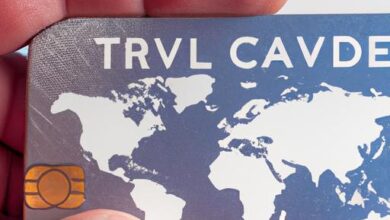What Travel Documents Do I Need: A Comprehensive Guide
Imagine embarking on your dream vacation, eagerly packing your bags and planning your itinerary. But wait, have you considered the necessary travel documents? From passports to visas, navigating the world of travel documents can be daunting. In this comprehensive guide, we’ll explore the importance of travel documents and debunk common misconceptions, ensuring you’re well-prepared for your next adventure.
Importance of Travel Documents
Travel documents are the key to unlocking a world of exploration. They serve as your identity and legal authorization to enter foreign countries. Without the right documents, your travel plans can quickly turn into a nightmare. Imagine arriving at the airport, only to be denied boarding because you lack a vital document. Don’t let this happen to you!
Your passport, for instance, is a fundamental travel document that grants you access to different countries. It acts as proof of citizenship and serves as an identification document. Moreover, many countries require a visa for entry, which is an endorsement on your passport granting permission to enter, stay, or transit in that particular country. Understanding the validity requirements and visa types is crucial to avoid any last-minute surprises.
Common Misconceptions about Travel Documents
Let’s address some common misconceptions that can lead to unnecessary stress and confusion. Firstly, some travelers believe that a passport alone is sufficient for all international travel. However, many countries have specific visa requirements, so it’s essential to research and obtain the appropriate visas before your journey.
Secondly, some assume that identification documents such as driver’s licenses or national identification cards are universally accepted for travel. While these IDs may be useful domestically, they typically do not suffice for international travel. It’s vital to have a passport as the primary identification document when venturing abroad.
As we delve deeper into this guide, we’ll explore the essential travel documents, additional documents, and specific requirements for different destinations. Stay with me to ensure a smooth and hassle-free travel experience!
Essential Travel Documents
When it comes to international travel, there are a few essential documents that you must have in order to ensure a seamless journey. Let’s explore these vital travel documents in detail:
A. Passport
Your passport is a travel document that holds immense importance. It not only serves as proof of your nationality but also acts as your primary identification document while traveling abroad. Ensure that your passport is valid for at least six months beyond your intended stay in a foreign country to avoid any complications.
- Importance and Validity Requirements
Your passport is your ticket to the world. It grants you access to different countries and serves as your identity in foreign lands. Make sure to keep your passport secure and in good condition at all times. Losing or damaging your passport can lead to significant delays and complications during your travels.
- Visa Requirements and Types
While having a passport is essential, many countries require a visa for entry. A visa is an official endorsement on your passport that grants you permission to enter, stay, or transit through a particular country. Visa requirements vary from country to country, so it’s crucial to research and understand the specific visa requirements and types for your intended destination.
B. Identification Documents
In addition to your passport, it’s essential to carry identification documents while traveling. While some countries may accept your passport as the sole identification, it’s advisable to have additional identification documents as a backup.
- Driver’s License
If you plan on renting a car or driving abroad, having a valid driver’s license is crucial. While a driver’s license may not serve as a primary identification document for international travel, it can be useful for renting vehicles and certain domestic activities in foreign countries.
- National Identification Card
Some countries may accept a national identification card as a valid identification document. However, it’s important to note that not all countries recognize this form of identification, so it’s always best to carry your passport as the primary identification document.
By ensuring that you have your passport and relevant identification documents in order, you’ll be well-prepared to embark on your travel adventures. Stay tuned as we explore additional travel documents and specific requirements for different destinations!
Additional Travel Documents
When it comes to travel, it’s crucial to consider more than just your passport and visas. Additional travel documents can provide peace of mind and ensure a smooth journey. In this section, we’ll explore the importance of travel insurance and health documents.
A. Travel Insurance
Travel insurance is your safety net while exploring the world. It provides coverage and benefits that can protect you from unexpected events. From trip cancellations to medical emergencies, travel insurance offers financial protection and assistance when you need it most.
- Coverage and Benefits
Travel insurance typically covers a range of situations, including trip cancellations or interruptions, lost or delayed luggage, medical emergencies, and even emergency evacuation. Depending on the policy, it may also include coverage for personal liability, legal assistance, and emergency cash advances. Familiarize yourself with the specific coverage details provided by your chosen insurance provider.
- Importance for International Travel
When traveling internationally, the importance of travel insurance amplifies. Medical expenses abroad can be exorbitant, and without insurance, you could find yourself facing hefty bills. Additionally, travel insurance can offer assistance in case of flight delays or cancellations, ensuring you’re not left stranded in an unfamiliar destination.
B. Health Documents
Taking care of your health while traveling is essential. Certain health documents can be required or recommended, depending on your destination.
- Vaccination Certificates
Some countries have specific vaccination requirements to protect against infectious diseases. For instance, when traveling to certain regions, you may need proof of vaccination against diseases like yellow fever or typhoid. Research the vaccination requirements of your destination well in advance and consult with a healthcare professional to ensure you’re up to date with immunizations.
- Medical Prescriptions
If you require prescription medications, it’s crucial to have the necessary documentation while traveling. Carry a copy of your prescriptions, as well as a letter from your healthcare provider explaining the need for the medication. This can facilitate the customs process and ensure you have access to the medications you require during your trip.
By taking these additional travel documents into account, you can protect yourself against unforeseen circumstances and prioritize your well-being throughout your journey. Let’s move on to the next section, where we’ll discuss specific travel document requirements for various destinations.
Travel Documents for Specific Destinations
When it comes to specific travel destinations, there are additional requirements and documents you need to consider. Let’s explore two popular destinations and the necessary travel documents for each.
Schengen Area
If you’re planning to visit countries within the Schengen Area in Europe, understanding the Schengen visa requirements is crucial. The Schengen visa allows you to travel freely within the 26 participating countries without the need for additional visas. To obtain a Schengen visa, you’ll typically need the following:
-
Schengen Visa Requirements:
- Completed application form
- Valid passport with a minimum of six months validity from the intended date of departure
- Recent passport-sized photographs
- Proof of travel medical insurance with a minimum coverage amount
- Flight itinerary or proof of accommodation
- Proof of financial means to cover your stay
-
Additional Documents Needed:
- Depending on the purpose of your visit, additional documents may be required. For example, if you’re traveling for business, you may need an invitation letter from the hosting company. If you’re visiting for tourism, you may be asked to provide a detailed itinerary of your trip.
United States
For those planning a trip to the United States, understanding the Visa Waiver Program (VWP) and Electronic System for Travel Authorization (ESTA) requirements is essential. The VWP allows citizens of participating countries to travel to the US for tourism or business purposes for up to 90 days without a visa. To take advantage of the VWP, you need to meet the following criteria:
-
Visa Waiver Program:
- Be a citizen of a participating country
- Have a valid Electronic Passport
- Have a return or onward ticket
- Travel for either tourism or business purposes only
- Stay in the US for no more than 90 days
-
ESTA Requirements:
- Prior to traveling, you must apply for approval through the Electronic System for Travel Authorization (ESTA). This online system collects biographical and eligibility information to determine your eligibility for the VWP.
Before traveling to any specific destination, it’s crucial to check the current travel requirements and any changes that may occur. Being well-informed about the necessary travel documents ensures a smooth and stress-free journey.
Tips for Managing Travel Documents
When it comes to travel documents, proper management is the key to a stress-free journey. Here are some essential tips to keep in mind:
A. Safekeeping and Backups
Imagine misplacing your passport in a foreign country or having it stolen. The consequences can be dire, causing delays, frustration, and potential identity theft issues. To avoid such mishaps, follow these precautions:
-
Secure Storage: Keep your travel documents in a safe and easily accessible place, such as a locked travel document organizer or a hotel safe. Avoid carrying them loose in your pockets or bags where they could be easily lost or stolen.
-
Digital Copies: Make digital copies of your travel documents, including your passport, visa, and identification cards. Store these copies securely in cloud storage or email them to yourself. This way, even if your physical documents are lost or stolen, you can easily access the digital copies and expedite the replacement process.
-
Emergency Contacts: Maintain a list of emergency contacts, including the local embassy or consulate, your country’s embassy or consulate, and your travel insurance provider. In case of any document-related emergencies, you’ll have the necessary contact information at hand.
B. Timely Document Renewal and Validity Check
To ensure smooth travels, it’s crucial to stay on top of document renewal and validity. Consider the following:
-
Passport Renewal: Check your passport’s expiration date well in advance of your trip. Some countries require a minimum of six months’ validity remaining on your passport, so plan accordingly and renew your passport if necessary.
-
Visa Validity: If you’re traveling with a visa, verify its validity before your departure. Some visas have specific entry and exit dates, and overstaying can lead to serious consequences. Be aware of any visa renewal requirements and ensure you comply with them.
-
Regular Check-ups: Periodically review your travel documents to ensure they haven’t expired or been damaged. Stay informed about any changes in entry requirements or visa policies for your intended destinations.
By following these tips, you can proactively manage your travel documents, minimize the risk of loss or complications, and enjoy a worry-free journey.
Stay tuned as we move forward, exploring specific travel document requirements for various destinations!
Conclusion
In conclusion, it is undeniable that having the correct travel documents is crucial for a seamless and enjoyable travel experience. From passports to visas, each document plays a significant role in ensuring your entry into foreign countries. By understanding the importance of these documents and debunking common misconceptions, you can avoid unnecessary stress and complications during your travels.
Remember, your passport is your gateway to the world. Make sure it is valid and meets the requirements of your destination country. Additionally, research visa requirements well in advance and obtain the necessary visas to avoid any last-minute surprises.
Furthermore, it’s essential to consider additional travel documents such as travel insurance and health documents. Travel insurance provides peace of mind by offering coverage for unforeseen circumstances, while health documents like vaccination certificates and medical prescriptions ensure your well-being during your journey.
Different destinations often have specific requirements, such as the Schengen Area’s visa requirements or the United States’ Visa Waiver Program. Being aware of these requirements and having the necessary documentation will save you from any unnecessary complications.
Lastly, managing your travel documents effectively is crucial. Safeguard your documents, keep backups, and ensure timely renewals to avoid any inconveniences.
By following these guidelines and staying well-prepared, you can embark on your next adventure with confidence, knowing that you have all the necessary travel documents in hand. So, what travel documents do you need? Now you have the answers. Bon voyage and safe travels!
“The world is a book, and those who do not travel read only a page.” – Saint Augustine
Conclusion: So above is the What Travel Documents Do I Need: A Comprehensive Guide article. Hopefully with this article you can help you in life, always follow and read our good articles on the website: Game Zone



